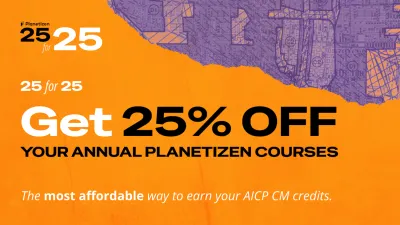It is undeniably a challenging time in higher education and an object lesson in the power of uncertainty. However, a planning education is all the more needed in times of turmoil.

These are challenging times in higher education. When Planetizen staff emailed in March to ask if I could explain the current state of planning schools given recent federal actions, my first thought was it was too soon to explain. However, while the situation is complex, as of mid-April some patterns are more clear. I've talked with faculty in my institution and at other planning schools, read the pages of the Chronicle of Higher Education and other higher education news sources, and interacted with students as they navigate this in real-time. A lot is changing and it can be hard to work out what new initiative is part of a negotiation and may change next week, what might stop after the mid-term elections in late 2026, and what is more long-term. The main takeaway is that there’s a great deal of uncertainty. However, planners have experience managing uncertainty. A planning education is useful now and will be useful in the future.
I focus on some of what is new, but it is also important to say that work goes on in planning schools. Faculty, students, and staff continue to engage in teaching, research, and learning. Students get internships and jobs. But in this complicated time, a few issues stand out.
The situation is evolving fast. As many people have pointed out, the current executive branch of the U.S. federal government is eliminating or replacing many different higher education and research related programs, grants, and activities. Legal challenges will likely slow and stop many changes but such lawsuits need time to work through the courts. While different universities are in different situations, just this last week, faculty at my university sued the federal government about demands made in late March and early April that threatened to cut off billions of federal research across the campus and affiliated hospitals. The rationale of the administration is related to claims of antisemitism following protests over the war in Gaza but the attack is much broader. A later set of even more strenuous and unprecedented demands from federal agencies asked for everything from a mask ban to externally auditing all students, faculty, and staff for their viewpoints and requiring governance "exclusively" by those most "committed to the changes" demanded. On April 14, Harvard’s central administration refused to agree to the government’s terms. In response, on the same day, the Department of Health and Human Services froze over $2 billion in grants and contracts.
One crucial challenge is, then, uncertainty. I am reminded of former planning faculty member Peter Marris’ 1996 book on the Politics of Uncertainty which argued for “a way of thinking about power which emphasizes control over contingencies rather than control over resources—the ability to manoeuvre in the face of uncertainties, often at the expense of others whose power is less” (p. 1). That is, Marris argued for a theory of power where more powerful people may try to displace uncertainty onto those with less power who then have to manage in a situation where predictability and the capacity to plan are undermined. Marris proposed instead a “politics of reciprocity” as “reciprocal, co-operative strategies against uncertainty will be more successful eventually, even for the powerful, as well as more humane” (p.2). Of course there are other ways to understand the situation, but Marris resonates with me at the moment both in terms of the problem and the potential solution in a politics of reciprocity.
Threats to research and other funding are key concerns to universities. Planning faculty obtain federal grants for important and useful research—in areas from hazards to transportation and housing—and many are now paused or under review. Such cuts include not only eliminating specific grants but reducing the indirect costs that can be charged to pay for overhead, such as space and basic administration. Universities have signed staff contracts, built facilities, and bought equipment, assuming a specific cash flow. While a judge barred the reduction to NIH grants on April 4, it will likely be appealed. Still more suits have followed. If the reductions go through, the wider university would need to fill the gap. Universities are also bracing for increased taxes on endowments or even loss of tax exempt status. Universities will work to maintain the core teaching mission, including student support, but there is a lot to address.
Another set of issues involves potential changes related to direct funding to students. Planetizen had initially asked me about the Department of Education (DoE), which the U.S. President has proposed eliminating. It helps to distinguish between changes to government agencies, programs, regulations, and staffing. As planners know, agencies can be reorganized while still maintaining core functions and personnel. In addition to enforcing civil rights laws, the DoE provides individuals with grants, loans, and work-study to pay for higher education. While abolishing a department requires an Act of Congress, as would eliminating many of the programs, it is possible that loans and other programs could be moved to different departments and staff cuts will also have an effect. At present, the outcome is uncertain.
International students, researchers, and faculty have specific concerns while remaining important parts of the planning student community. International students contribute to the classroom, the profession of planning in a global context, and the economies of the places where they study. They remain an important and much valued part of our planning programs. I came to the U.S. as an international student. Higher education is a substantial contributor to the economy and international students make it a major export business (which happens when international students bring money to the U.S.). Well-publicized detentions and visa revocations have created uncertainty, however, including for planners. So far, these affect a small percentage of the million or so international students in the U.S., but the problems are concerning to students and programs. Some researchers and faculty have been affected. When the last Trump administration imposed various restrictions on international students, universities challenged them and I would expect that to happen again. But even more mundane problems, such as longer visa processing times, can be disruptive to both students and programs, hurting people and the U.S. economy.
As students ponder their planning careers they see a new landscape. We are fortunate that planning happens at many levels of government, as well as in nonprofits and the private sector so the action is not all federal. Planning addresses issues that are important to everyone--homes, neighborhoods, social connections, local jobs, green spaces--and they will remain important. Pierre Clavel has documented many progressive cities under less-than-supportive presidents from the 1960s to the 1980s and beyond. Students have long been interested in work outside the U.S. and are increasingly investigating skills-based migration for urban planners and other high-potential migration programs. Starting a degree program in 2025 gives time for the situation to be clarified. However, all students are having to navigate an evolving context.
There are many other changes of course, some of great importance in education, research, and the wider profession. There's a broad threat to academic freedom and professional expertise. Another change is the loss of public data. The U.S. government has removed numerous web pages and datasets assembled at significant cost. Some entities are saving data, but there are risks to continuity. Diversity, Equity, and Inclusion programs have been a focus for federal review; however, higher education has already faced court cases about admissions, so this is not completely new. The planning profession is still committed to equity. The Department of Housing and Urban Development is under a cloud. The list goes on. Every day there is something new.
It is undeniably a challenging time and an object lesson in the power of uncertainty. A planning education is all the more needed in times of turmoil. It provides the knowledge, skills, and values to improve the futures of places and communities in uncertain times, capacities that will be needed in coming years.
Thanks to Aubrey Sanders for comments on an earlier version.

Maui's Vacation Rental Debate Turns Ugly
Verbal attacks, misinformation campaigns and fistfights plague a high-stakes debate to convert thousands of vacation rentals into long-term housing.

Planetizen Federal Action Tracker
A weekly monitor of how Trump’s orders and actions are impacting planners and planning in America.

San Francisco Suspends Traffic Calming Amidst Record Deaths
Citing “a challenging fiscal landscape,” the city will cease the program on the heels of 42 traffic deaths, including 24 pedestrians.

Defunct Pittsburgh Power Plant to Become Residential Tower
A decommissioned steam heat plant will be redeveloped into almost 100 affordable housing units.

Trump Prompts Restructuring of Transportation Research Board in “Unprecedented Overreach”
The TRB has eliminated more than half of its committees including those focused on climate, equity, and cities.

Amtrak Rolls Out New Orleans to Alabama “Mardi Gras” Train
The new service will operate morning and evening departures between Mobile and New Orleans.
Urban Design for Planners 1: Software Tools
This six-course series explores essential urban design concepts using open source software and equips planners with the tools they need to participate fully in the urban design process.
Planning for Universal Design
Learn the tools for implementing Universal Design in planning regulations.
Heyer Gruel & Associates PA
JM Goldson LLC
Custer County Colorado
City of Camden Redevelopment Agency
City of Astoria
Transportation Research & Education Center (TREC) at Portland State University
Jefferson Parish Government
Camden Redevelopment Agency
City of Claremont






























